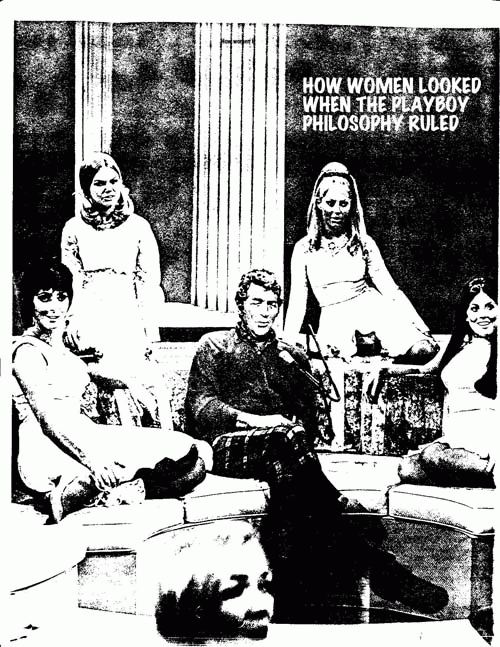If you grew up in the 1980s and 1990s, you might have escaped the "Playboy philosophy," developed and sold by magazine icon Hugh Hefner. It decreed that women were just another commodity of a swinging lifestyle like a good sports car, stereo ("hifi") and cigar. Women could be bought, sold--and traded in for a newer model whenever a man wanted. Most did not even have to be dosed with quaaludes.
In Playboy clubs across the country, "bunnies" wore corset-like outfits to produce hourglass figures, whether or not they had them, sometimes causing them orthopedic problems. They donned bunny ears and a white tail and were supposed to serve customers with a back-arched, knees-bent "bunny dip." ("Always remember," said the job manual, "your proudest possession is your Bunny tail. You must make sure it is white and fluffy.")
From its first 1953 issue with Marilyn Monroe, through Bo Derek, Suzanne Somers, Farrah Fawcett, Jenny McCarthy, Cindy Crawford, Pam Anderson, Daryl Hannah and Anna Nicole Smith, Playboy managed to collar many famous and beautiful women to pose for nude foldouts.
Left wingers and progressives were agnostic about the Playboy philosophy. Some credited Hefner, with his eternal bathrobe and pipe, with helping the nation lose its 1950s Puritanism and gray flannel workaholism and enjoy recreational sex and drugs. Women, whose lives could be ruined at the time by unwanted pregnancies, were no longer "bad" if they consented to sex thanks to the Playboy philosophy.
On the plus side, Playboy also addressed social issues said a 2010 movie called Hugh Hefner: Playboy, Activist and Rebel. It rescued orphans during the Vietnam war, supported a group helping runaway young people evade prostitution and was an early civil rights voice, "liberating" the segregated New Orleans Playboy Club so that African-American men could enjoy bunny dips too.
But others, notably women, say Playboy simply
mainstreamed porn from its peep show status to something Dad could read and
monetized the sexual debasement of women. Hefner's daughter, Playboy
Enterprises CEO Christie Hefner was the ultimate casualty of the Playboy
philosophy's second class view of women said critics--not pretty enough to
pose in the magazine but not male
enough to rate Playboy stock which dad bestowed to his sons only. "A hare not an heir" read Chicago
news stories about the stock snub to his daughter in 1997.
(A Summa Cum Laude graduate of Brandeis University, Christie Hefner told the Daily Telegraph as a "feminist" she would not take the magazine hardcore but dad overruled her and bought X-rated television stations in 2001.)
Beneath the surface, there was a sordid side to the Playboy philosophy, too. Hefner admitted to being a Dexedrine and Pepsi addict, for example. And when asked in the movie about the murder of playmate Dorothy Stratten in 1980, he says it gave him "a stroke" and it was a "miracle" he lived through it. Let's talk about me! He also whines in the movie that the suicide of bunny Bobbie Arnstein because of a drug scandal temporarily ruined the Playboy name and blames federal drug agents.
It is no surprise that Bill Cosby, who was a frequent guest at the Playboy Mansion and reportedly had bunny girlfriends, would espouse the women-as-commodity philosophy. But he is far from alone.
Many other cultural icons from Cosby's era praise "Hef" in Hugh Hefner: Playboy, Activist and Rebel too from late night personalities Dick Cavett and David Steinberg to Roots author Alex Haley and actors Robert Culp and Tony Curtis. Kiss' Gene Simmons, famous for verbally abusing Terry Gross in an NPR interview, and a leering James Caan, linked to Hollywood prostitute broker Heidi Fleiss, also appear. Even the late Rev. Malcolm Boyd, author of Are Your Running With Me Jesus, appears in the movie apparently also okay with a philosophy that deems half the world worthy of wearing bunny tails.
The outrage over Cosby's sexist remarks shows the Playboy philosophy is long gone and offensive to almost everyone. So, apparently, is Cosby's career.
(Note: You can view every article as one long page if you sign up as an Advocate Member, or higher).






